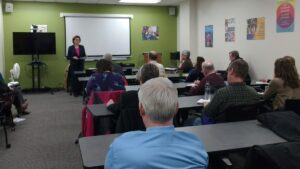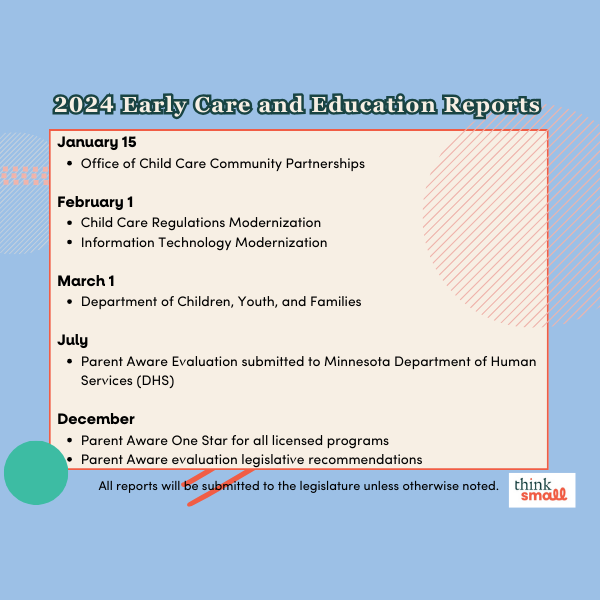Legislative Task Force on Child Care Access and Affordability
Senator Melissa Wiklund, DFL-Bloomington, was one of the presenters at the February Policy Hour organized by Minnesota’s Future and hosted by Think Small. Sen. Wiklund talked about a report by the Legislative Task Force on Child Care Access and Affordability.

Senator Wiklund presents at February Policy Hour.
- Develop consistency and uniformity in regulatory enforcement; improve relationships and communication between the Minnesota Department of Human Services (DHS), county licensors, and child care providers; and improve fairness in compliance measures.
- Develop and implement uniform training for county licensors, including rules, statutes, and providers’ rights.
- Target changes in policy and procedures that help to create a healthy environment in which monitoring visits are supportive, not punitive.
- Establish a safe communication process for providers to ask questions without fear of immediate negative actions.
- Implement an immediate feedback system of potential compliance orders before the licensors leave the home or facility, and allow providers the opportunity to fix issues on the spot.
- Communicate a clear appeals process to providers.
- Ensure training is accessible, relevant, and affordable; and broaden and deepen the trainer pool.
- Determine ways to encourage providers from communities of color and American Indian communities to become trainers.
- Determine ways to provide better access to training that reflects cultural competencies.
- Align “annual” and “license period” training requirements.
- Encourage community training opportunities through partnerships with schools, public health, Child Care Aware, initiative foundations, etc.
- Support mentor programs that are provider-to-provider based.
- Additional recommendations for DHS.
- Streamline and reduce redundancies in paperwork.
- Coordinate nighttime and statewide meetings with providers, not just day-time metro meetings, before initiating any changes.
- Reform and invest in the Child Care Assistance Program (CCAP).
- Increase CCAP provider reimbursement rates.
- Increase funding for the Basic Sliding Fee program so more eligible families can access assistance.
- Change eligibility for CCAP from six months to twelve, providing for greater stability for children and providers.
- Determine ways to address costs for middle income families, whether through targeted funding, tax policy, or community/business investments in child care.
- Consider investing in new or expanding existing child care tax credits for middle-income families.
- Study and share community success stories to help others.
- Consider incentives for businesses to invest in on-site child care.
- Long Term
- Consider the creation of an independent board for child care providers.
- Encourage more people to enter and stay in the child care provider workforce.
- Consider ways to address emergency child care assistance for families fleeing abuse.
To read the entire report, click here.What’s Next?In the House of Representatives, the Subcommittee on Child Care Access and Affordability is addressing some of these items. The Human Services Reform Finance and Policy Committee, chaired by Senator Abeler R-Anoka, will be in charge of taking up the issue in the Senate. Governor Dayton’s early childhood budget includes proposed changes and funding for CCAP as well as expanded child care tax credits.Senator Wiklund encouraged people to contact their own legislators to advocate for policies that are important to them. She also suggested contacting members on relevant committees.
PreK to 3 Design Team
The second presenter was Erin Gavin, Education and Learning Program Director at the McKnight Foundation, who talked about the work of the PreK to 3 Design Team. The Design Team is a group of people in the Minnesota early education field who discuss how to support PreK to 3rd Grade alignment in the state. Because PreK has been a priority issue recently, much of their work focused on how to best provide that for children.The team released an initial report in July of 2016. You can read it here. This week they issued a revised report based on new information and feedback. The core message is the same: A mixed-delivery approach will work best for Minnesota. This means children and families should be able to access high-quality early education in a variety of settings: Licensed Family Child Care, Child Care Centers, Head Start, and public schools. Quality is more important than setting.Other recommendations include:- Voluntary Participation.
- Targeted Universalism. This term, developed by john powell, advocates giving resources first to the most in need to achieve success for everyone. The Design Team recommends starting with families at 185% of poverty.
- Local solutions and approaches. Use Local Collaborative Hubs to implement.
- Ensure high-quality programming that is culturally responsive and aligned to K-3 standards
- Families need, want, and deserve choice.
- The early childhood workforce needs support and diversity.
The original report recommended requiring a Bachelor of Arts degree within 10 years for providers statewide. However, the team has rescinded this recommendation in the new report for various reasons. More details in this presentation.The idea of the Local Collaborative Hubs comes out of work in Oregon and North Carolina that empowers communities to implement solutions that work best for them. They could be led by counties, districts, or cities, depending on what lawmakers and stakeholders decide is best.Audience members noted the issue of compensation for early learning professionals. Although research supports the importance of quality care and education for children 0-5, many people who provide that care are compensated poorly, at rates much lower than elementary school teachers. Compensation is one of the large barriers to establishing and maintaining a qualified workforce.Currently there are two national groups with a Minnesota presence that are focusing on the workforce issue. There is a group using the The National Academies report to look at workforce solutions. Additionally, the National Governor’s Association has a group of state experts meeting about the topic.Next steps for the design team are:
- Continue to advise state agencies as requested
- Continue as a learning community
- Look closer at workforce challenges and solutions
Policy Hour is a monthly opportunity for early childhood and afterschool professionals to connect with each other and learn about current policy issues in an informal setting. It is provided to the field at no cost by the Minnesota’s Future Coalition.








